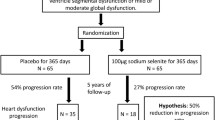Abstract
Chagasic patients with cardiomyopathy have low levels of selenium (Se), a fundamental trace element. We evaluated the effect of supplementing infected mice with Se (0.25–16 ppm). Supplementation with 0.25 or 1 ppm Se led to parasitaemia and survival curves similar to those of the control group. Mice treated with 4–16 ppm showed a dose-dependent decrease of parasitaemia, significant for the highest concentration. This was probably due to a direct effect on the parasites, which were lysed after in vitro incubation with Se. Survival rates did not change significantly; however, heart damage was reduced in infected mice supplemented with 4 ppm Se, as indicated by a lower cardiac isoform of creatine kinase levels. Our results imply that Se supplementation does not lead to a general protection during infection, but may help protect the heart from inflammatory damage. The effect of Se supplementation in the course of T. cruzi infection depends on the host-parasite pair employed.

Similar content being viewed by others
References
Andrade AL, Zincker F (1995) Chronic malnutrition and Trypanosoma cruzi infection in children. J Trop Pediatr 41:112–115
Araújo-Jorge TC (2000) O camundongo. Modelos animais para o estudo in vivo da doença de Chagas. In: Araújo-Jorge TC, De Castro SL (eds) Doença de Chagas: manual para experimentação animal. Fiocruz, Rio de Janeiro, pp 134–174
Barceloux DG (1999) Selenium. Rev Clin Toxicol 37:145–172
Davis CD, Brooks L, Calisi C, Bennett BJ, McElroy DM (1998) Beneficial effect of seleniun supplementation during murine infection with Trypanosoma cruzi. J Parasitol 84:1274–1277
De Souza AP, Oliveira GM, Nève J, Vanderpas J, Pirmez C, De Castro SL, Araújo-Jorge TC, Rivera MT (2002) Trypanosoma cruzi: host selenium deficiency leads to higher mortality but similar parasitemia in mice. Exp Parasitol 101:193–199
De Souza AP, Olivieri BP, De Castro SL, Araújo-Jorge TC (2000) Enzymatic markers of heart lesion in mice infected with Trypanosoma cruzi and submitted to benznidazole chemotherapy. Parasitol Res 86:800–808
Ganther HE (1999) Selenium metabolism, selenoproteins and mechanisms of cancer prevention: complexities with thioredoxin reductase. Carcinogenesis 20:1657–1666
Gomez RM, Solana ME, Levander AO (2000) Host selenium deficiency increases the severity of chronic inflammatory myopathy in Trypanosoma cruzi-inoculated mice. J Parasitol 88:541–547
Hennet T, Peterhans E, Stocker R (1992) Alterations in antioxidant defenses in lung and liver of mice infected with influenza A virus. J Gen Virol 73:39–46
Henriques-Pons A, Oliveira GM, Paiva MM, Correa AFS, Batista MM, Bisaggio RC, Liu C-C, Cotta-de-Almeida V, Coutinho CMLM, Persechini PM, Araújo-Jorge TC (2002) Evidence of a perforin-mediated mechanism controlling cardiac inflammation in Trypanosoma cruzi infection. Int J Exp Pathol 83:67–79
Kiremidjian-Schumacher L, Roy M, Wishe HI, Cohen MW, Stotzky G (1996) Supplementation with selenium augments the functions of natural killer and lymphokine-activated killer cells. Biol Trace Element Res 52:227–239
Nève J (2000) New approaches to assess selenium status and requirement. Nutr Rev 58:363–369
Raich PC, Junxuan L, Thompson HJ, Combs GF (2001) Selenium in cancer prevention: clinical issues and implications. Cancer Invest 19:540–533
Rivera MT, Souza AP, Hasslocher-Moreno AM, Xavier S, Gomes JAS, RochaMOC, Correa-Oliveira R, Nève J, Vanderpas J, Araújo-Jorge TC (2002) Progressive Chagas' cardiomyopathy is associated with low serum selenium levels. Am J Trop Med Hyg 66:706–712
Spallholz JE (1994) On the nature of selenium toxicity and carcinostatic activity. Free Radic Biol Med 17:45–64
Taylor EW, Cox AG, Zhao L, Ruzicka JA, Bhat AA, Zhang W, Nadimpalli RG, Dean RG (2000) Nutrition, HIV, and drug abuse: the molecular basis of a unique role for selenium. J Acquir Immune Defic Syndr 25:S53-S61
Truyens C, Torrico F, Angelo-Barrios A, Lucas R, Heremans H, De Baetselier P, Carlier Y (1995) The cachexia associated with Trypanosoma cruzi acute infection in mice is attenuated by anti-TNF-α, but not by anti-IL-6 or anti-IFN-γ antibodies. Parasite Immunol 17:561–568
Tsunoda M, Johnson VJ, Sharma RP (2000) Increase in dopamine metabolites in murine striatum after oral exposure to inorganic but not organic form of selenium, Arch Environ Contam Toxicol 39:32–37
Turan B, Hotomaroglu O, Kilic M, Demirel-Yilmaz E (1999) Cardiac dysfunction induced by low and high diet antioxidant levels comparing selenium and vitamin E in rats. Reg Toxicol Pharmacol 29:142–50
Acknowledgements
We are grateful to Dr. Linda A. Jelicks for a critical review of the manuscript and to Marcos Meuser Baptista and Alexandre H. de Oliveira for their technical assistance. This work was supported by grants from CNPq, FIOCRUZ and FAPERJ and was performed in accordance with the guidelines established by the FIOCRUZ Commission of Ethics for the Use of Animals, resolution 099/99-PR.
Author information
Authors and Affiliations
Corresponding author
Rights and permissions
About this article
Cite this article
de Souza, A.P., de Oliveira, G.M., Vanderpas, J. et al. Selenium supplementation at low doses contributes to the decrease in heart damage in experimental Trypanosoma cruzi infection. Parasitol Res 91, 51–54 (2003). https://doi.org/10.1007/s00436-003-0867-9
Received:
Accepted:
Published:
Issue Date:
DOI: https://doi.org/10.1007/s00436-003-0867-9




